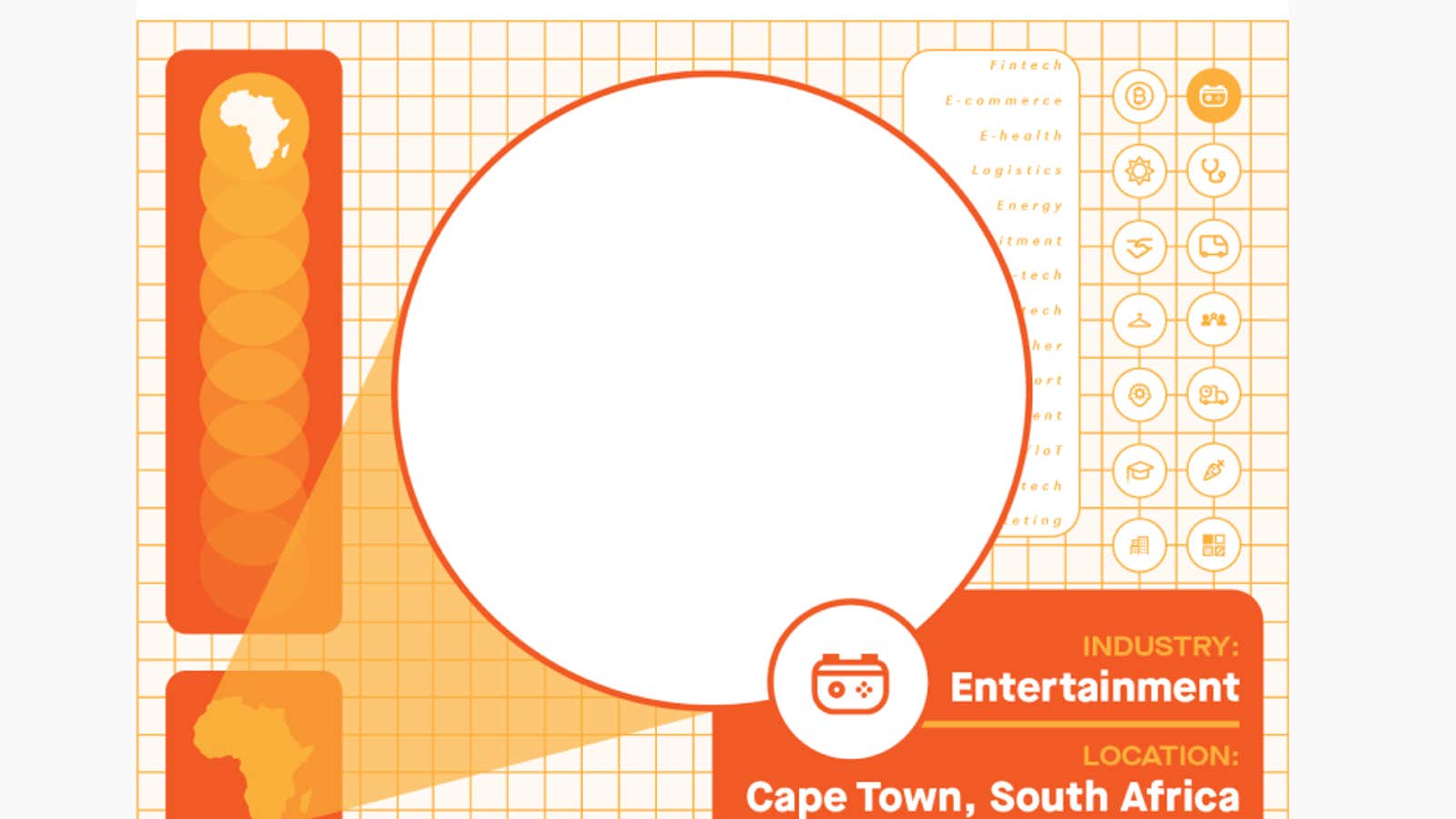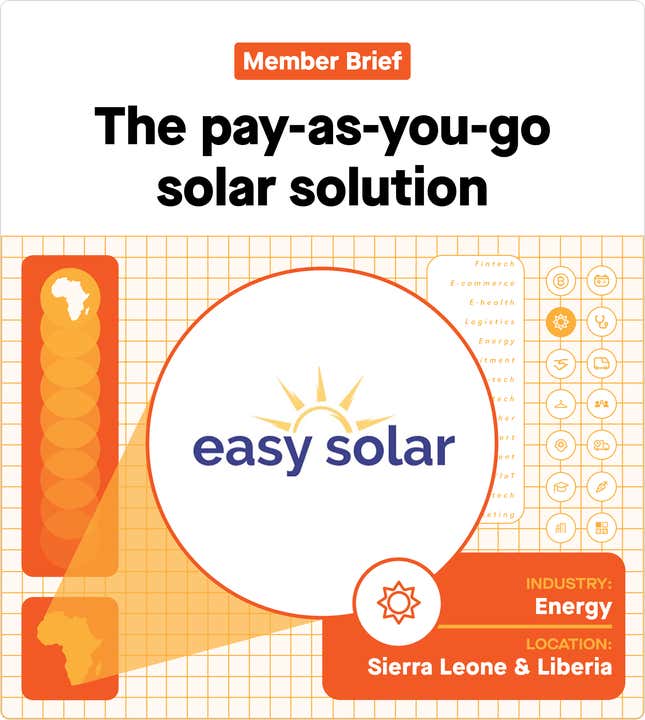
Hi Quartz Africa members!
Africa has some of the most expensive electricity in the world, and more than half of the continent’s population doesn’t even have access to it. These include those who are either too poor to afford power, or live in remote places without last-mile connectivity.
Scarce resources mean governments struggle to prioritize between expanding the reach of last-mile distribution, replacing aging power infrastructure, and saving power utilities that are drowning in debt. As a result, Africa’s electricity gaps restrain businesses, restrict the availability of services, leave people impoverished, and put a cap on quality of life. As the continent’s population soars in coming years, these problems only stand to get worse.
Cue solar. To improve access to affordable, consistent, and sustainable power, many companies are emerging to offer solar-powered systems to those for whom the regular grid is out of reach. Companies like Easy Solar, M-Kopa, d.light, Azuri Technologies, and Greenlight Planet offer appliances as small as a solar lantern to charge a phone, or as sophisticated as a solar system for electrifying a house. To make the upfront investment manageable, especially for those with limited credit histories, users pay it off in small increments on a weekly or monthly basis.
In other words, there’s an opening at the intersection of Africa’s power gaps and the clean-energy transition for identifying and scaling off-grid solutions.
Cheat sheet
💡 The opportunity: Electricity is an essential need. People in Africa want to get connected, but what’s provided by governments—on-grid electricity—is too expensive for many and doesn’t reach everywhere. Less than half of sub-Saharan Africa had access to electricity in 2019; in South Sudan and Chad, the number was less than 10%. That means a market for alternative sources of electricity.
🤔 The challenge: Creating off-grid solutions that make electricity both accessible and affordable in Africa will require overcoming hurdles like official skepticism, financing, and tax and shipping burdens.
🌍 The road map: Providing solar equipment to low-income earners and those in remote areas, with the ability to pay the investment off in installments, is one way of getting electricity to the underserved.
💰 The stakeholders: Investors include Trine, a Swedish impact-investing platform; Acumen, a US-based nonprofit impact-investment fund; FMO, a Dutch entrepreneurial development bank; and the Africa Renewable Power Fund of the UK’s ARCH Emerging Markets Partners, an investment advisor.
By the digits
53%: Share of people in sub-Saharan Africa without electricity in 2019
93%: Share of people in South Sudan without electricity in 2019
$5 million: Amount Easy Solar raised in its Series A round in 2020
22: Number of African energy startups that received funding in 2021
9: Number of African energy startups that raised $1 million+ in 2021
$104 million: Amount raised by African energy startups in 2021
48%: Year-over-year increase in funding for African energy startups
4.8%: Share of total funding raised by energy startups in Africa in 2021
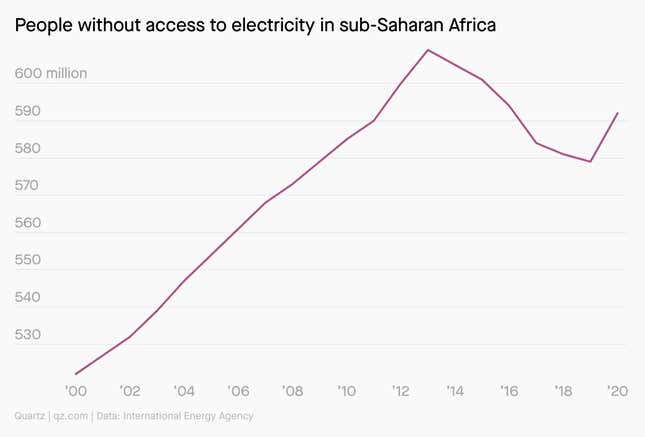
The case study
Name: Easy Solar
Founded: 2016
HQ: Freetown, Sierra Leone, with operations in Sierra Leone and Liberia
Founders: Nthabiseng Mosia (current CMO), Alexandre Tourre (current CEO) and Eric Silverman (current sales and operations director)
Latest funding: $5 million Series A in 2020
Easy Solar works to make energy and financial services affordable and accessible for those with limited access to power in Sierra Leone and Liberia. The company sells systems such as solar lanterns for lighting and mobile charging, solar home systems with appliances like TVs and fans, and kilowatt-sized systems for residential, commercial, and industrial users. To make those systems affordable, Easy Solar provides financing options through a pay-as-you-go model.
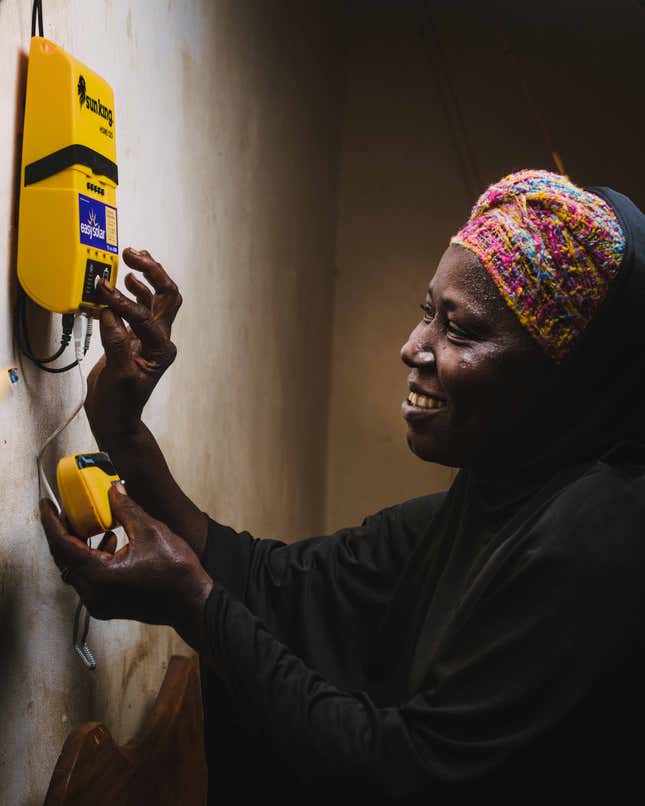
The company’s products are available from a wide network of agents and shops, which Easy Solar built as a last-mile retail network. Vendors in the network sell the products, provide after-sale services, and collect cash from customers. Easy Solar says it has to date powered 100,000 homes in Sierra Leone—equivalent to 10% of the country’s households.
By providing a solution to expensive and inaccessible power, Easy Solar is technically addressing three problems and working at the intersection of three sectors: energy, last-minute retail distribution, and microfinance.
In conversation with
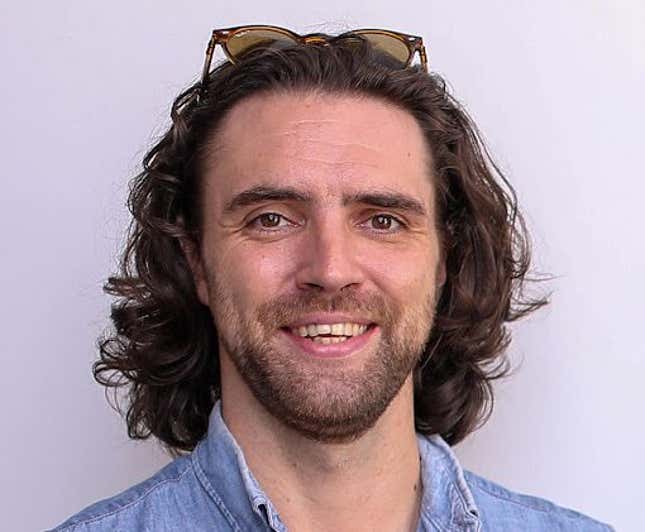
Alexandre Tourre is one of three co-founders of Easy Solar. He has a background in engineering, computer science, and financial advisory, and a CV that includes five years at PWC in France, plus six months in mobile money and financial inclusion at Kenya’s Safaricom. Easy Solar began as a graduate school project for Tourre and his co-founders at Columbia University’s School of International and Public affairs. Here are some choice quotes from our conversation.
☀️ On Easy Solar’s strategy:
“Our goal was not to try to be the most innovative new model. There’s this giant issue of energy access that doesn’t really go down that much because [the] population is growing almost faster than people are electrifying homes. Our focus was how [to] provide access to as many people as fast as we can.”
📈 On expansion plans:
“We have a real strong belief that it is more important to go in depth in the markets that we’re in than to go wide and expand quickly.”
💡 On the regulatory environment:
“We’re operating in countries that are rather open and positive about the prospect of off-grid electrification.”
Energy deals to watch
Daystar Power, a Lagos-based provider of hybrid renewable energy, raised a total of $62 million in 2021. The company offers solar “Solar-as-a-Service” (100% solar power) and “Power-as-a-Service” (hybrid power solutions with battery storage) products.
Solarise Africa, a Kenyan energy leasing company, received $5.9 million in debt funding in 2021. The company specializes in captive rooftop and ground-mounted solar projects.
Sun Exchange, a South African renewable energy startup, raised $4 million in 2020. The company crowdsources funds for solar panels that it leases to customers.
Learn more with Quartz Africa
☀️ Biden’s crusade against fossil fuels won’t work in Africa
📱 Fintech can become a force for renewable energy adoption
⚖️ Solar providers face increased regulation in Kenya
💸 Nigeria’s unreliable electricity costs its economy $29 billion a year
⬛ Blackouts in Africa mostly affect the poor
🎵 This brief was produced while listening to “Kua Buaru” by Calema ft. Soraia Ramos, Pérola & Manecas Costa (São Tomé and Príncipe)
Have a highly motivated rest of your week,
—Carlos Mureithi, east Africa correspondent
One 🌄 thing
Morocco’s Ouarzazate Solar Power Station, also called the Noor Power Station, is the world’s largest concentrated solar power plant. It has a capacity of 510 MW.
